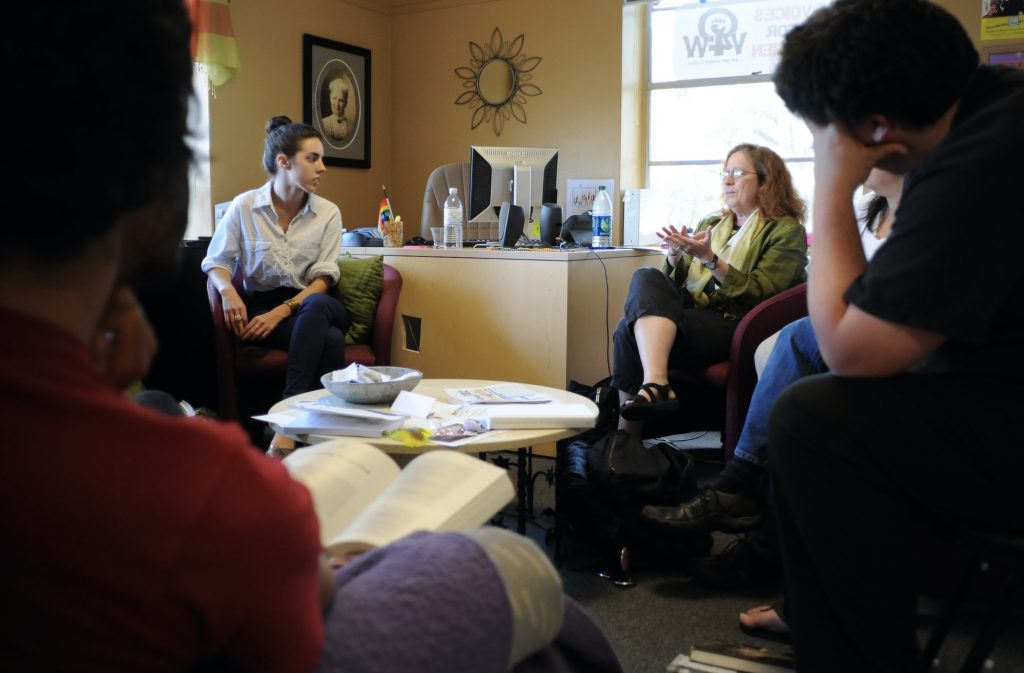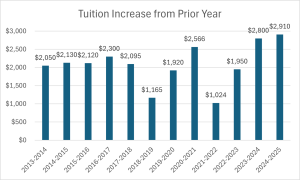
(Photo courtesy of Scott Cook)
Despite recommendations to increase its size and scope, the Lucy Cross Center’s leadership positions and compensation for staff members have been cut, hindering its mission to promote gender equality through gender-inclusive events and discussions.
The director position of the Lucy Cross Center was eliminated in the summer of 2018. The position is now a recommended responsibility for the director of the Sexuality, Women’s and Gender Studies (SWAG) program, a minor that analyzes social justice issues.
“It felt as though we were being told it was supported, but it felt like it was being squeezed out,” said Dr. Jill Jones, professor of English and previous director of the Lucy Cross Center.
The graduate assistant position was also eliminated, along with the course release compensation for the director position, which allowed the role to count as teaching credits for a faculty member.
“To say there is still a faculty director is a misrepresentation. If the compensation for a role is eliminated, the role is effectively eliminated,” said Dr. Margaret McLaren, current coordinator of SWAG and original co-founder of the Lucy Cross Center in 2010.
“Unfortunately, that role is a big job (bigger than the time that a course release compensates for) so it is not feasible for a faculty member to do this without the necessary release time,” said McLaren.
The position and course release removals came after the Diversity Council, at the request of President Grant Cornwell, completed a task force evaluating gender equity at Rollins. At the beginning of each year, he works with them to develop a charge for the year. He said that he is concerned about gender equity at Rollins; “I believe we should have a robust, supportive program for women’s identity and professional development,” said Cornwell.
At the end of its study, the Diversity Council recommended that the College provide more funding, support, and staff to the Lucy Cross Center, but instead, all three areas were reduced.
The task force collected data in the fall of 2017 and the spring of 2018 from faculty, staff, and students about their experiences regarding gender equity and inclusion on campus.
It conducted focus groups, issued surveys, and analyzed similar college’s practices. Then, it provided a series of recommendations on how to improve gender equity.
The Diversity Council’s final report stated that “a co-director model should be developed with a faculty co-director who is given at least one course release to be present and involved with programming, and a full-time staff person, present and available during normal working hours.” Instead of following the recommendation, the College demoted the director position, removed the course release, and eliminated the graduate student position.
At this time, there are no full-time staff members fully dedicated to running the Lucy Cross Center, which, according to the Diversity Council’s report, could harm marginalized students. “Our findings lead us to believe that failing to staff the center adequately and appropriately is potentially harmful for students who are marginalized and needing appropriate support on campus,” the report stated.
Justifying the changes
The changes were initiated by Cornwell; Dr. Mamta Accapadi, vice president for student affairs; and Dr. Susan Singer, vice president for academic affairs and provost.
Accapadi said that the Diversity Council “gives recommendations of a ‘perfect world,’ and then we implement what is realistic.”
Accapadi said that after reviewing the Diversity Council’s recommendation, she did not believe it was reasonable from a budget standpoint. “What we did, that’s not the recommendation. We agree with their principle, and we believe that we still honor that,” she said.
Cornwell defended their decision to remove the course release from the director position. “Course releases are a complicated currency in faculty workload. I’m always inclined to be very austere with course releases,” he said.
“Given faculty’s training to do what they do best, which is to be outstanding professors, one course release is one less available course for students to take. In that sense, every course release is a loss. It’s great when you have a student affairs professional collaborating with a faculty advisor who has academic expertise in the area. When these collaborations are working well, each of the partners is bringing their respective skills to the work to be done. I’m not persuaded that you need another course release,” said Cornwell.
*Jones agreed that a course release uses resources, but added: “If we value gender equity as we say we do, then we will put our resources behind them.”
The Center for Inclusion and Campus Involvement (CICI), which oversees all student organizations and promotes diversity, now manages the Lucy Cross Center and its three work-study students. Accapadi said that there is a dedicated full-time staff member in CICI who works on diversity and inclusion programming support. She said this includes the administrative tasks and mentorship of student leaders in the Lucy Cross Center.
“We shifted all the planning to Abby Hollern, and with SWAG, we don’t need an additional faculty member,” said Singer. Abby Hollern is the director of CICI.
Singer said she believes that the co-ownership between the Lucy Cross Center and CICI gives the students a better voice.
“I think this model of involving students, faculty, and staff provides the best of everything mixed in there. We just have to keep playing with it. Everybody values Lucy Cross tremendously.”
Cornwell said, “From what I see this year in the richness of the Lucy Cross offerings, it looks like they’re fulfilling their mission under CICI. Once we try this model, if it emerges that we are short on staffing, I am open to proposals on how best to address it.”
‘It’s impossible for Lucy to reach its full potential’
The change caused confusion among former Lucy Cross staff members and students about how much the College values its role. Those involved fear that without as much faculty involvement, outreach will become difficult. Faculty and staff are not barred from participating in Lucy Cross activities, but there is little incentive to do so without compensation for their time.
“I wish someone had consulted with me throughout this process. I was asked to write up a plan that involved a lot of students, faculty, and staff, but I feel that nobody looked at it,” said Jones, who had been the director of the Lucy Cross Center since 2015.
Since its founding in 2010, the Lucy Cross Center has held discussions about women’s issues and has helped advocate for social justice. It holds a Women of Color lunch twice a month for women of color and their allies, runs menstrual product donations, and hosts weekly discussions surrounding gender equality.

(Courtesy of Laura J. Cole)
“It only ran as well it did because of the grad assistant and me as director working together. I’m not sure why it never had a solid budget,” said Jones.
Historically, the Lucy Cross Center was funded by the Office of the Provost and the Academic Dean’s office through discretionary funds. This means that when funds were needed, a request would have to be submitted for approval to the aforementioned offices.
This year, according to Accapadi, it is funded through the CICI, and its budget is $7,500 for student programming initiatives.
“The Lucy Cross Center has been through different departments and has been led by a lot of awesome women on campus; however, it’s been having trouble finding consistent support in terms of staffing and funding,” said Gabbie Buendia (‘19), one of the three work-study students at the Lucy Cross Center.
“The current work-studies report to the staff at CICI and they have been wonderfully supportive throughout all of Lucy’s transitions. But without the course release and proper compensation for a Lucy director, whether it be a faculty or staff member, it’s impossible for Lucy to reach its full potential,” said Buendia.
“Abby Hollern is a remarkable woman. CICI is a terrific organization, but it’s been added to their plate without any additional compensation. You no longer have the co-curricular, co-academic partnership. It’s not the same, but they’ll do a great job,” said Jones.
Advocating for faculty and staff
According to McLaren, the changes impact the Lucy Cross Center’s ability to effectively provide for faculty and staff.
“As a co-founder of the Lucy Cross, I can tell you that originally, the Lucy Cross was envisioned as a center that would address gender issues and concerns for not only students, but also faculty and staff,” said McLaren.
McLaren expressed how important she believes faculty involvement with the Lucy Cross is, “especially in terms of advocacy and bringing more faculty involvement.”
Hollern echoed this. “Faculty are at the core of the academic experience of our students—they are able to advocate and educate in ways that are critical to the student experience,” she said.
To try and keep faculty involved with the Lucy Cross Center, Hollern created the “Faculty & Staff Fridays” program. Every Friday from noon to 1 p.m., a faculty or staff member leads a discussion about a topic of their choosing in the Warden Dining Room.
“This allows students to be exposed to staff or faculty who they may have otherwise never met in a relaxed environment and build relationships around similar interests with peers,” said Hollern. Topics have ranged from raising children to “mansplaining” to how to navigate dating apps. “It’s a really fun way to end the week,” she said.
Currently, there is no dedicated space for the Lucy Cross Center. Originally, it was in Chase Hall, but that building will soon be demolished to make way for the new lakeside residential complex. However, the Lucy Cross Center will have a space in the residence hall that is projected to be completed in the fall of 2020.
Until construction on the new residence hall is completed, the Lucy Cross will be in the Sutton Lounge alongside CICI.
*Correction: An original version of this quote said that Jones disagreed with Cornwell. That was misquoted.















Be First to Comment